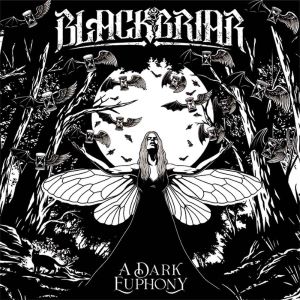Of all the acts that weren’t getting signed over the last decade, Blackbriar certainly stood up as one of the most consistently headscratching. A beautiful, gothic-drenched symphony that dreamt up whimsical and haunting fairy tales – the music of Blackbriar had no contemporary. Listen to only a few seconds, even without Zora Cock’s vocal presence, and you’d be bound to pick up on the fact that it was them. So it was with some great pleasure that the news was shared that Blackbriar was going to sign with Nuclear Blast for their future endeavors, even if the band had certainly earned their reputation on their own (covering everything from media presence to videos) there’s just something extra about being able to be signed to one of metal’s biggest labels. So as the band’s second full-length album (and first for a major label), how does A Dark Euphony stack up? Why just as impressively as any of their previous works, of course.
As alluded to already, Blackbriar managed to jump out of the gate with a style and sound that was unique. Nothing has changed in that regard with A Dark Euphony, but the band continues to tweak and improve their sound – augmenting it to bring it to even greater levels of immersion. One great case in point is that of “Far Distant Land,” which incorporates a stronger Celtic vibe to their fairy tale metal and does so without it feeling like the usual folk metal fare. Instead, the fog-riddled mystique gives the track a certain warmth to it, particularly when Zora’s swirling vocals hit the chorus complete with chugging riffs and Celtic accompanies the ending. “Spirit of Forgetfulness” follows, which showcases some of the most massive orchestrations that the band has done – the chorus sounds entirely unreal as it builds into this massive, soaring theatrical piece that is also bound to stick in your head. The track gave out some well-earned chills with just the upbeat, wall-of-sound atmosphere – it’s a powerful accomplishment that just sounds heavenly.
With all of the potent build up in the orchestration, there’s still a strong sense of intimacy to the band’s music. “The Evergreen and Weeping Tree” is as rich a dark ballad as they’ve ever done, a haunting track that pulls you into an inviting bit of gloom, then all but exploding into rising melancholy at the end when it reaches it’s masterful conclusion. Later cut “Thumbelina” lures the listener into a false sense of playfulness, slowly increasing the sense of foreboding until the track hits a heavier, more gut-wretching urgency later on that all but demands your attention. Ending with the more mysterious and alluring “Crimson Faces,” the contrast between the sweeping orchestrations, massive riffs, and Zora’s delicate vocals make for a thrilling conclusion that leaves with a powerful bang, but one that feels surprisingly human still instead of more overtly bombastic. It’s here that you can really track Blackbriar’s increasingly impressive ability to harness the most grandiose of moments and keep the listener so immersed in the music that it feels like you are among the fairy tales rather than simply listening to them.
Blackbriar have consistently upped their game over the years, and A Dark Euphony seems like another crowning achievement. They don’t simply make a soundtrack for fairy tale stories, but weave together a sensation of actually drifting off into the pages of one of Grimm’s stories and living it out in your head. Their orchestrations have never sounded more majestic and powerful, yet the band’s music has never felt as full of genuine emotion – be it dread, horror, sorrow, or cheer – and that mixture of big budget storytelling with a personal narrative that gives Blackbriar the leverage they need to become one of the symphonic/gothic metal leaders in the scene.


